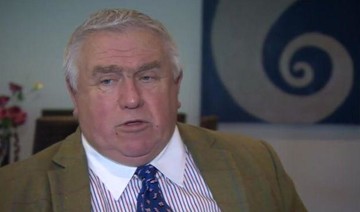LEWES, United Kingdom: Sitting by the fireplace in her house in the south of England, Jackie Bennett recalls the shock she felt when she received out-of-the-blue an eviction notice giving her just two months to move out.
This so-called no-fault eviction, which sees Bennett kicked out of her home without cause, is a feature of English law that could soon be abolished under a new rental bill.
But campaigners have warned that landlords are ramping up these types evictions ahead of the ban being passed into law.
“I’ve canceled some of my work. I’ve canceled my Christmas plans and my holiday plans,” the 55-year-old artist explained, as she pushed back tears.
Hanging across her apartment are colorful crocheted tapestries that mask the damp that covers the walls of her house in Lewes, southern England.
Her landlord explained to her by email that she wanted to sell the property after Bennet had already received the eviction notice.
As a tenant, “you always feel vulnerable,” she said.
No-fault evictions were introduced in 1988 by Margaret Thatcher’s government as part of a push to deregulate the rental market to attract more private landlords.
Under the new Renters’ Rights Bill, currently under consideration by the Labour majority parliament, landlords will have to provide a reason in advance for evicting tenants, such as to reclaim the property to move into or unpaid rent.
The bill would give tenants a longer notice period in the event of an eviction, giving them more time to plan their next housing arrangement.
It marks an important step in protecting tenants against being evicted after they make reasonable complaints to landlords, said Ben Twomey, chief executive of tenants rights organization Generation Rent.
These instances, termed “revenge evictions” by campaigners, are a “massive problem” in England, he added.
While he supports the reforms, Twomey warned that in the absence of a rental price caps, tenants could still be evicted “through the back door” by landlords hiking rents to unreasonable levels.
Rents have already jumped over nine percent in the past year in the UK, according to official data.
Between July and September this year, 8,425 households in England where taken to court over no-fault eviction notices, the highest number in eight years, said Twomey, citing Ministry of Justice figures.
As the bill comes closer to being passed into law, more landlords have been ramping up the use of no-fault evictions, according to Paul Shamplina, founder of Landlord Action, a company that helps landlords repossess properties.
“That will increase until the ban date comes in, because landlords are worried about how will they get their property back,” he added.
Alexandra Casson, who works in television production in London, was also served one of these eviction notices after she refused her landlord’s attempt to raise the rent by over 50 percent.
She denounced it as “an absolute brazen attempt to extort tenants.”
“They forget that there are humans that live in the property assets that they shuffle around,” said the 43-year-old, based in East London’s popular Dalston neighborhood.
Casson, a member of the London Renters Union, welcomed a measure in the new bill that would extend the notice period to vacate a property from two months to four months.
Although, she predicts that it’ll take her around six months to finalize purchasing a new property, and even then, she considers herself one of the lucky ones.
‘You always feel vulnerable’: Britons impacted by no-fault evictions
https://arab.news/pshb5
‘You always feel vulnerable’: Britons impacted by no-fault evictions

- This so-called no-fault eviction is a feature of English law that could soon be abolished under a new rental bill
- Campaigners have warned that landlords are ramping up these types evictions ahead of the ban being passed into law


























